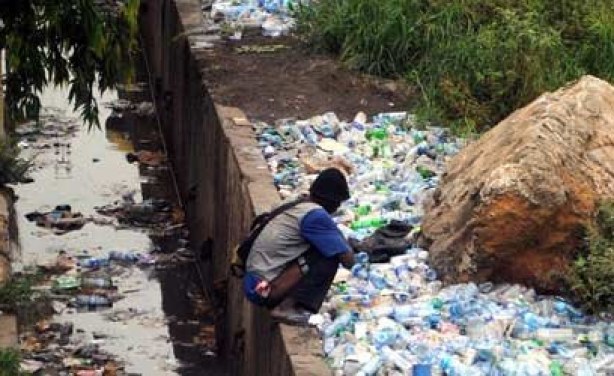By Victoria Effiong
Shoot and throw
Imagine having to do number one and two (urinate/defecate) inside a bucket in your room or backyard?
Imagine also having to dispose of the contents of that bucket in broad daylight with passersby staring at you in disgust.
In fact, you might even inhale the stench from that bucket all night long because it is too late at night and unsafe to go outside to dispose of it.
Do you feel disgusted with the scenario painted above or think it is one of those pranks played by a comedian-turned journalist?
Unfortunately, this is not a prank and not an imaginary story to make you feel bad either.
It is a normal way of life for some residents of Calabar, the capital of Cross River State, once rated Africa and Nigeria’s cleanest and greenest city.
This is the story of Odamba East community of Akim Qua town right in the heart of Calabar.
Calabar is not only the capital of Cross River State but also the first capital of Nigeria because it served as the first capital of the Southern Protectorate, the Oil River Protectorate, and Niger Coast Protectorate.
This was until the late 19th century, when the administrative center of the Southern Protectorate was moved to Lagos in 1906.
But Calabar has lost its glory, its beauty, and its pride of place as one of the most pleasant cities in Nigeria.
Currently in in many communities within the metropolis, access to toilets and safe water are luxuries only the rich can afford.
Even when some households can afford to dig soak-away pits for their toilets, they fill up with more water than waste in less than six months, regardless of their depth.
While in the process of providing one for his family, a retired soldier, Johnson Umoren, and his 18-year-old daughter, Grace, shared their experiences of living without a toilet.
One could see clearly the picture of shame and disgust in their eyes as they spoke.
Many have, however, blamed the topography and the failure of successive governments of the state to provide a central sewage disposal system for the people of the area.
Due to this challenge, residents of Odamba East with an estimated population of over 500 have resorted to open defecation or using buckets which are disposed of in very unsanitary ways.
To be able to empty one’s bowels, one must be an expert in the art of squatting in dark corners, gutters, or bushes.
And the Odamba people, young and old, have mastered the arts and are unbeatable.
The Chairman of Odamba East community, Emmanuel Effiong, recounted how difficult life is for the residents of the area.
He said not only do they have to unwillingly defecate in the open, they also do not have access to safe and clean drinking water, refuse disposal bins or even good roads.
“We cannot get clean water from boreholes because of the ground not giving us what we want.
“I cannot count how many people have tried to dig boreholes in these communities, but they can’t achieve it.
“The government has failed us because if the government provides us with clean water, toilet facilities and waste disposal bins, people will change their attitude and start practicing good hygiene,” Mr. Effiong told our reporter.
Edet Asuquo, another resident, bemoaned the high cost of drilling and re-drilling boreholes just to get water that is unsafe for use by the people.
He said, “Sometimes it would not be up to 15 minutes after fetching, the water will turn to brown because the land is swampy.
“I spent two hundred and fifty thousand naira to dig the first borehole which was not good and three hundred and fifty thousand to dig this second one which is still not good.
“The water surface is always covered with a reddish-brown substance. It is not good for storage or washing of whites. It is painful that I have a borehole but still must buy water.”
A drink of cholera
Our reporters spotted some tell-tale signs that there may be a body of water nearby as they explored the inner recesses of Odamba community.
On getting there they saw someone drinking from a small dirty body of water which the residents refer to as a stream.
Samuel Ekpo was on his way back from work on a hot afternoon and was feeling thirsty and decided to stop by the stream and bent over to scoop the water with his two hands and drank.
One of our reporters captured the moment he drank from the dirty stream, and it seemed Mr. Ekpo and other residents of the area have little or no choices.
While interacting with Guardpost, Ekpo, argued that there was nothing wrong with drinking from the stream since most residents of the community drank from the stream.
He responded in the negative, and added that many people build houses without toilets in the area.
Just like Ekpo, most residents of Odamba do not understand that there are consequences for living the way they do.
But the importance of proper hygiene practices and access to water, sanitation, and hygiene (WASH) facilities cannot be overstated.
They help to prevent illnesses that impact families and livelihoods and most importantly, kill children.
Experts say open defecation affect everyone, but women and girls are more prone to experiencing violence and multiple health vulnerabilities like hookworm infestation resulting in maternal anemia.
Analysis of water samples
Guardpost subjected the samples of water collected from three boreholes that service the community and the stream where Mr. Ekpo confidently drank from.
The test was conducted by Chance Consult Nigeria Limited, a Calabar-based firm that supports Water, Sanitation and Hygiene (WASH) programmes in the state.
Applying the Nigerian standard for drinking water quality (NSDWQ)-NIS 554:2015, the result revealed heavy metals in proportions higher than the
World Health Organization (WHO) and NSDWQ prescribed standards.
Water sample from the borehole in Edet Asuquo’s compound
The sample showed 6.45 milligrams per liter (mg/l) of iron, 0.08 mg/l of manganese, 56.0 mg/l of nitrate, 0.28 mg/l nitrite, 0.11 mg/l of chromium, 162.0 mg/l of chloride, 0.12 mg/l of ammonia and 0.02 mg/l of nickel.
Interpretation:
The sampled water is not only highly contaminated but also has unusual color, odour and turbidity and contains high level of iron, manganese, nitrate, ammonia, sulphide, and chromium.
It is, therefore, not suitable for domestic purposes and can only be improved by conventional treatment processes.
Sample from the borehole in Eno Paul’s compound
The water showed turbidity at 64.4 per mg/l; iron at 0.64 per mg/l; aluminum at 0.12 per mg/l; sulphide content at 0.012 per mg/l, chromium at 0.24 per mg/l; phosphate at 8.43 per mg/l; calcium at 21.4 per mg/l, and chloride at 41.0 per mg/l.
Interpretation:
The water source is putrid and has higher concentrations of physical, chemical and bacteriological parameters. It is not safe for consumption.
Sample from Joseph Emmanuel’s borehole
The above sample revealed 0.00 mg/l of iron; 0.00 mg/l chromium; 12.8 per mg/n of nitrate, 0.02 mg/l of nitrite and a PH level of 5.9 mg/l.
Interpretation:
While the water is slightly acidic, the PH level is within acceptable level for ambient water and the rest of the parameters tested are also within acceptable concentration for drinking water. The borehole in Joseph Edem’s compound is rated suitable for drinking and domestic use.
Water sample from Odamba stream
The sample contains coliform count of 50 per 100 ml; fecal coliform count of 22 per 100 ml; nitrate of 0.21 per mg/l; ammonia of 0.11 per mg/l; sulphide of 0.12 and chromium of 0.06 mg/l.
Interpretation:
This water source looks harmless because of the satisfactory physical parameters of color and turbidity. However, chemical parameters of nitrate, sulphide and chromium are indications of decaying organic matter.
The stream is contaminated with microbial pathogens but can be purified
via filtration and chlorination.
Health implications
Experts say that long term exposure to high levels of chromium as shown in the test results cause asthma, bronchitis, contact dramatis, lung cancer and hypersensitivity.
According to the Collaborative on Health and the Environment, high levels of nitrates in water can cause heart attack, cognitive impairment and delay in development
Although iron is needed in drinking water for the heart, its high level in drinking water can cause diabetes and hemochromatosis which can damage the liver, the heart, and the pancreas.
Long-term ingestion of water with high levels of ammonia can lead to ammonia poisoning, fever, chest pain, difficulty in breathing and cough.
Samples collected from Odamba stream showed high count of coliform and fecal matter.
Drinking such water can result in stomach pain, vomiting, diarrhea, headache, fever, kidney failure and hepatitis in people with weakened immune system like children and the elderly.
The concept of portable drinking water is that it has to be safe for drinking and cooking, but two out of the three borehole samples collected are not suitable for domestic purposes unless through purification while the stream is highly contaminated.
ODF STATUS OF CRS
One would naturally expect that Odamba East and Odamba West would enjoy the basic rights to water, and sanitation as recognised by UN, simply because they exist as a part of Cross River, a leading state in Nigeria in terms of open defecation free (ODF) status.
In 2019, it was predicted by WASH actors that by 2023 the state will be completely ODF in all the local government areas based on the Guardian Newspaper report of March 25, 2019.
With a total of 18 local government areas in the state, only six have attained ODF status.
This was made possible by the provision of WASH services and facilities in schools, communities, healthcare facilities and public spaces.
There was a strong campaign using the Community Led Total Sanitation (CLTS) approach, to trigger and empower community members to change their attitudes towards hygiene and sanitation.
Financial support was also made available to enable households to construct toilets.
In 2018, the state came up with a draft roadmap for elimination of open defecation by 2025.
The roadmap had plans, activities, and investments to be made in the WASH sector.
But sadly since 2018 up till 2022, there has been no increase in the number of local governments that have attained ODF status.
The reality on ground makes it difficult to believe the government is still committed to ending open defecation.
Guardpost.ng visited the Rural Water Supply and Sanitation Agency (RUWASSA) being the key agency handling ODF campaigns in the state to ascertain the readiness to walk the talk on ODF.
Our correspondent had a joint interview with the Director General (RUWASSA), Etta Ikpeme and the Head of Department, Sanitation and Hygiene, Sarah Odey.
“The agency has the capacity, training and enthusiasm to follow through with the roadmap to eliminating OD in Cross River by 2025 but the only thing holding us back is finance,” Mr. Ikpeme said.
“The state government is still committed to ending open defecation by 2025 because that is the national roadmap which the state has keyed into.”
The RUWASSA boss admitted that to help most of the ODF communities keep up with their new way of life, provisions were made for construction of public toilets and boreholes.
Reacting to the situation in Odamba community, Mr. Etta suggested that the local government should pass a byelaw insisting that anybody that builds a house must have a toilet and periodic inspection taken to ensure compliance.
He insisted that the excuse that the area is waterlogged and under the sea level should not be accepted.
Goodwill without action
A WASH activist, Nanpet Chuktu, argues that after 2018, Cross River State has not invested in ODF nor engage new communities in ODF initiatives.
Mr. Chuktu said, “The level of investment is the problem. You don’t engage a few communities and stop.
“The Cross River State Government had demonstrated goodwill, made declarations at the international and national levels that they will be the first state to become open defecation free in Nigeria.
“But that commitment was not matched with funding. That is where we are because funding gives cross cutting advantage if we really want to achieve ODF by 2025.”
He, however, expressed optimism in the goodwill and commitment the state has demonstrated in the past and with renewed efforts by RUWASSA to push ODF activities in Obudu and Abi.
Mr. Chuktu said he is dissatisfied with the pace of work done and called for improved funding and spread beyond one local government area at a time.
For him, the situation in Odamba East is one out of several unique situations that can be addressed if public water from the state water board is available to the community.
He added that the community was right in the heart of the state capital, arguing that there is no reason why residents be denied pipe borne water by the water board.
He urged the residents of the area to still dig toilets but make plans to evacuate more frequently.
He suggested that the government can also help by providing public toilets and implementing lessons and models from the ODF communities in the state to champion the use of toilets.
President Muhamadu Buhari had in 2018, declared an emergency in the WASH sector and launched a national campaign called “Clean Nigeria: Use the Toilet.”
The campaign that was geared towards Nigeria’s journey to becoming open defecation free (ODF) come 2025.
If efforts and goodwill put into achieving ODF status in other parts of the country are extended to Odamba East and Odamba West communities and other unreached areas, Nigeria would have been sure of achieving an ODF status in 2025.
But that is still a tall dream.




